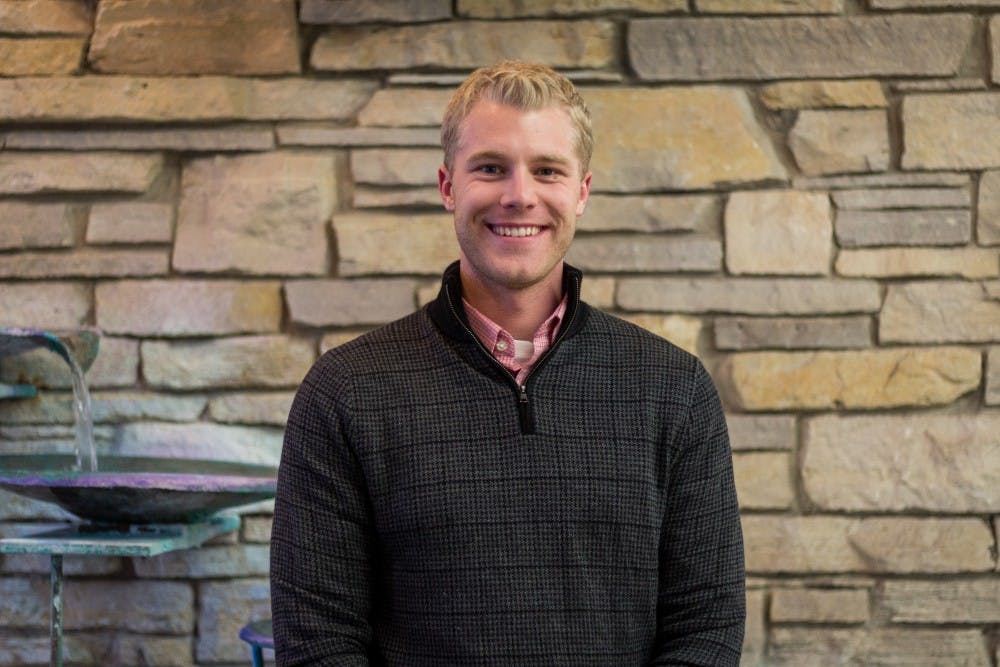Q&A: Neuroscience senior discusses research, volunteering
Howell senior Austin Waddell runs on a very busy schedule. Every day he juggles coursework, his own research project and participates in two volunteer organizations, serving leadership roles in both.
Waddell is a neuroscience major with a special interest in developmental disorders such as autism. He especially enjoys working with children.
He is currently working on his research project within neuroscience faculty member Kevin Park’s research lab. Most of the undergraduate students in Park’s lab work as lab assistants. However, Waddell wanted to start his own project.
Waddell sat down with Central Michigan Life to talk about what a day in his life looks like.
CM Life: "What is a typical day for you?"
Waddell: "Usually I get up around 6:30 a.m. and have something small to eat, like a banana. Then I go to the gym and I swim. I get back to my apartment around 7:30 (p.m.) and I eat a full breakfast, including eggs and a smoothie. I schedule all my classes early in the morning, so I am typically done with class by noon. Then I go into lab from noon to 6 (p.m.). Then I go home and eat dinner. After, I come back (to campus) to attend miscellaneous meetings for all the other things I have to do on a daily basis."
What is your research project like?
My project is seeing whether inducing cell cycles early in life causes changes in brain areas typically associated with autism. After you are born, neurons stop dividing. Once a neuron has been established as a neuron, it stops dividing. When a brain cell is told to divide, it dies, most of the time.
Recently, there have been a lot of genetic studies that have implicated different genes that are associated with cell cycle to be dysregulated in autism. We are trying to see changes in the mice that are typical of the changes we see in autism. We’re trying to see if the early disruption of cell cycle in the brain causes anything related to autism. We are going to look at a ton of different things and do a lot of different tests. We are causing an insult, which is cell cycle, that may or may not be involved in autism, and then we are seeing what kind of results we get.
Are you in any organizations on campus?
I have two main involvements: Global Brigades and Connections That Count.
I am the CFO of Global Brigades at CMU. We have five brigades that go to third-world countries in Central America over spring break: a public health brigade, a water brigade and medical/dental brigades — all of which work to improve the health and well-being of the locals. It’s a great experience. It’s very eye-opening to see the world from a perspective you probably can’t get anywhere in the United States.
Connections That Count is a service-learning program for children with special needs including autism, downs syndrome and other developmental disorders. Joan Hogan in the Counseling and Special Education department started it 15 years ago. We go swimming, bowling, playing sports at Morey Courts and we do craft nights. CMU students volunteer as mentors and chaperones. I love hanging out with the kids. If I’m having a bad day, I go there and in those two hours I can just forget everything that’s wrong.
What are your plans after you graduate?
I’m going to medical school next year. I already got accepted to Michigan State (University.) I interviewed here and at Case Western in Cleveland. I plan to interview at Mayo (Clinic) in Arizona and Cleveland Clinic. The Cleveland Clinic program is a five year program that is research-intensive. I want to be in academic medicine. I want to work at a big academic center, be a clinician, teach and do research. That’s the career path I would like.
Do you know what specialty you want to pursue?
One thing I’ve heard about medicine is that even within a specialty, people are always blown away by how many different things you can do. You don’t choose a specialty until after you finish medical school, so I want to keep an open mind. Obviously, neuro is where I lean, but I may find something else that interests me more. I really enjoy working with kids with developmental disorders.
Why do you like working with kids with autism?
My track into the whole autism thing was through my research. Then I took a neuroanatomy class and got close with the professor. She has dedicated her life’s work to autism from a clinical perspective. She gave me some amazing insights and she got me involved with Connections.
The reason I want to do that for my career is the same reason I like being a part of Connections.
Kids are really great to work with. They’re fun, happy and resilient. Treating kids is a great population to treat because they survive. They make it through really tough things. They are truly a joy to work with.
Where do you want to be in 10 years?
Ideally, 10 years from now, I will be in a residency training program at the Cleveland Clinic because it is one of the best hospitals in the world. I would like to go to school in Cleveland and immediately start working in Cleveland. Most of my family is from Cleveland. Ten years from now, I will be in training —I will still be in school.




